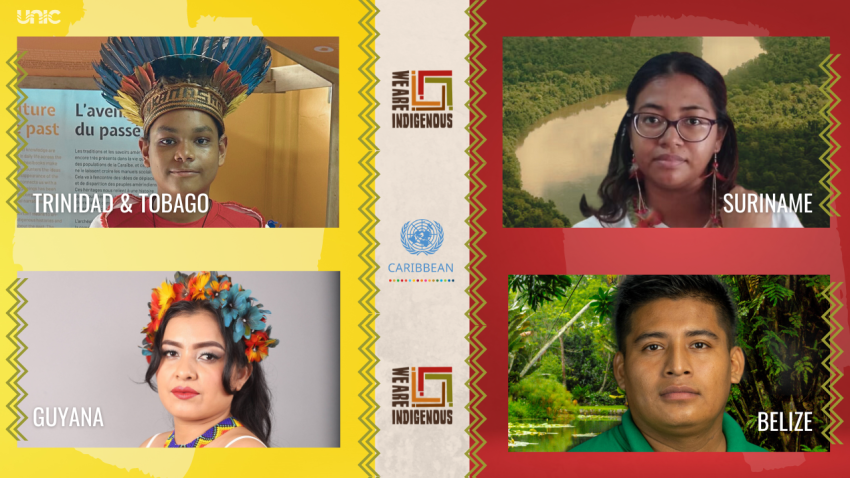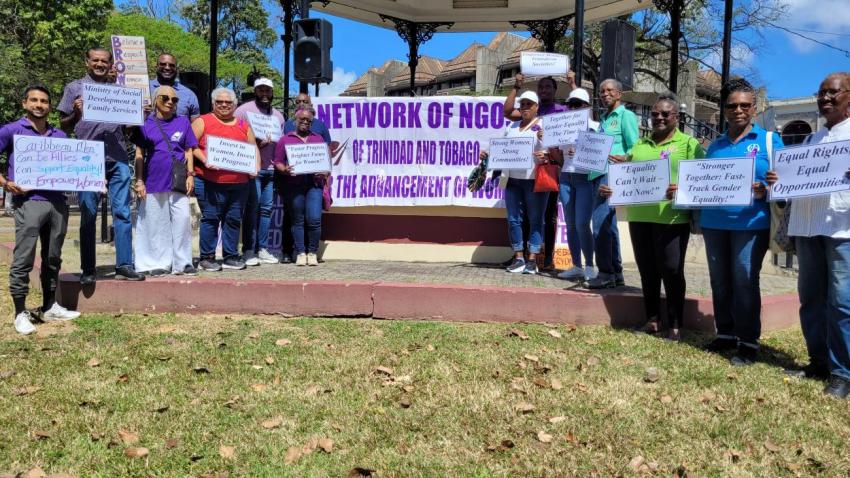Every year we celebrate the International Day of the World’s Indigenous Peoples on 9 August. This date was declared a United Nations (UN) observance by the UN General Assembly in 1994 and has provided an opportunity to celebrate the diversity, resilience and wisdom of indigenous peoples and communities ever since.
The day is also meant to call our attention to the challenges indigenous peoples face in a world where their way of life is under constant threat. In the Caribbean, the history of indigenous peoples is one of colonisation and marginalisation: they have had to fight to maintain their identities, retain ownership of their land, and protect their symbiotic relationship with nature ever since the arrival of European settlers.
The theme of this year’s observance “Indigenous Youth as Agents of Change for Self-determination” provided an opportunity to listen to the voices of young indigenous trailblazers who are leveraging their talents to address the challenges faced by their communities. Whether it’s by taking climate action, mobilising for justice or building on intergenerational connections, indigenous youth across the Caribbean are taking the lead and becoming authors of their own destinies. The UNIC selected four of these young people, each from a different Caribbean country and indigenous background, to share their stories.
Yefan Sealey – Nepuyo
As a Nepuyo youth living in Trinidad and Tobago, Yefan Sealey has found himself disappointed by the lack of opportunities to learn about indigenous cultures at school. Being a talented young artist and advocate for the Santa Rosa First Peoples Community (SRFPC), Yefan realised he could help educate about indigenous peoples.s
Yefan began to use his creative talents as a medium for sharing knowledge about Nepuyo culture with his young peers. Yefan's drawings showcase indigenous customs through depictions of utensils made from forest material and clay, musical instruments, and food and dress.
Yefan believes that the observance of International Day of the World's Indigenous Peoples is important for helping indigenous peoples around the world gain more visibility. The First Peoples of Trinidad and Tobago “have been invisible for many years” since the encounter with Columbus, Yefan told the UNIC, pointing to the centuries spent under Spanish, French and British rule, all of which led to the erosion of indigenous cultures.
Yefan said he would continue doing his part to advocate for the preservation of indigenous cultures, promising his talent would always be used to transmit knowledge of indigenous peoples.
Shylina Lingaard – Arowak
As a young Arowak indigenous woman, Shylina Lingaard cherishes the role her people play as guardians of nature and biodiversity. She is an officer at the bureau of the Association of Indigenous Village Leaders in Suriname (VIDS) and works alongside Indigenous traditional authorities and their communities in Suriname to ensure that the next generation will continue this tradition.
"Our rights are repeatedly being violated, we are driven from our lands – waters polluted and defenders killed," Shylina told the UNIC. She envisions instead a world where Indigenous traditional knowledge and skills are considered in policymaking and development-planning.
Shylina works to enlist more indigenous Youth advocates in the fight for justice by building on efforts of their elders to gain legal recognition of their collective indigenous peoples rights, including land rights. She works with young people to help them understand the impact of climate change on the indigenous way of life — where the traditions, customs and mindset depend on harmony with nature.
Shylina also works to educate indigenous young people about the message of the UN's Sustainable Development Goals and its call to Leave no one behind.
Florentino Chiac – Mayan
Florentino Chiac Jr is a Mayan youth who has transformed wildlife camera trapping into a citizen science initiative for monitoring biodiversity in the indigenous farming landscape of the Toledo District in Belize.
He performs this task as science manager at Ya’axché Conservation Trust where he stands at the forefront of safeguarding wildlife and ecosystems in protected areas managed by the organisation, as well as farmlands within the Maya Golden Landscape in Southern Belize.
Florentino's approach entails strategically placing cameras on farms to capture photos and videos of animals in their natural habitat. By engaging 27 farmers as custodians of the land and lens, he has successfully bridged the gap in communicating biodiversity information to farming families. This not only enriches scientific knowledge but has also led to behavioural changes among the farmers, helping them understand the significance of wildlife research and the role of their sustainable farming practices in contributing to biodiversity conservation.
For International Day of the World's Indigenous Peoples, Florentino told the UN in Belize his indigenous roots offer him a unique connection with the Mayan farming communities in Toledo that goes beyond scientific research and allows him to forge a bridge of cultural understanding and trust. He believes more indigenous youths want an opportunity to follow a similar path of protecting the rich biodiversity that has nurtured their communities for generations.
Rehanna Thomas – Akawaio
Growing up, Rehanna Thomas of the Akawaio peoples in Guyana noticed that indigenous communities sometimes lacked access to basic services. Coming from a background of strong female leaders, Rehanna felt inspired to step into a leadership role to help tackle this issue.
It was during her undergraduate studies that Rehanna immersed herself in the world of indigenous youth advocacy and policy training, beginning a journey that would continue to this day. She now does social work in indigenous communities in Guyana to help bridge the gap on inequalities faced by her people.
Speaking with the UNIC for #IndigenousDay, Rehanna said indigenous communities stand to inherit the consequences of multiple global crises they did not cause. This is why she uses her voice to help empower other indigenous youths to step into leadership roles and get involved in decision making.
Rehanna is also part of the group Amerindian Peoples Association (APA) which addresses human rights violations and works towards improving the general conditions of the Indigenous Peoples of Guyana.




